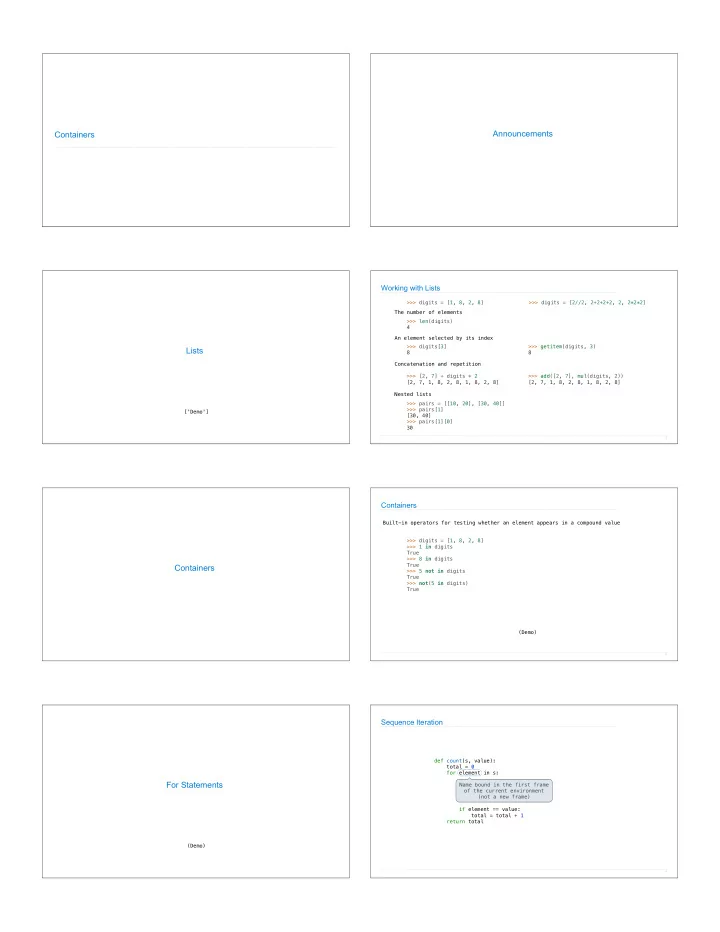

Announcements Containers Working with Lists >>> digits = [1, 8, 2, 8] >>> digits = [2//2, 2+2+2+2, 2, 2*2*2] The number of elements >>> len(digits) 4 An element selected by its index >>> digits[3] >>> getitem(digits, 3) Lists 8 8 Concatenation and repetition >>> [2, 7] + digits * 2 >>> add([2, 7], mul(digits, 2)) [2, 7, 1, 8, 2, 8, 1, 8, 2, 8] [2, 7, 1, 8, 2, 8, 1, 8, 2, 8] Nested lists >>> pairs = [[10, 20], [30, 40]] >>> pairs[1] ['Demo'] [30, 40] >>> pairs[1][0] 30 4 Containers Built-in operators for testing whether an element appears in a compound value >>> digits = [1, 8, 2, 8] >>> 1 in digits True >>> 8 in digits True Containers >>> 5 not in digits True >>> not (5 in digits) True (Demo) 6 Sequence Iteration def count(s, value): total = 0 for element in s: For Statements Name bound in the first frame of the current environment (not a new frame) if element == value: total = total + 1 return total (Demo) 8
For Statement Execution Procedure Sequence Unpacking in For Statements A sequence of fixed-length sequences for <name> in <expression>: <suite> >>> pairs = [[1, 2], [2, 2], [3, 2], [4, 4]] >>> same_count = 0 1. Evaluate the header <expression>, which must yield an iterable value (a sequence) A name for each element in a Each name is bound to a value, as in 2. For each element in that sequence, in order: fixed-length sequence multiple assignment A. Bind <name> to that element in the current frame >>> for x, y in pairs: ... if x == y: ... same_count = same_count + 1 B. Execute the <suite> >>> same_count 2 9 10 The Range Type A range is a sequence of consecutive integers. * ..., -5, -4, -3, -2, -1, 0, 1, 2, 3, 4, 5, ... range(-2, 2) Ranges Length : ending value - starting value (Demo) Element selection : starting value + index >>> list(range(-2, 2)) List constructor [-2, -1, 0, 1] >>> list(range(4)) Range with a 0 starting value [0, 1, 2, 3] * Ranges can actually represent more general integer sequences. 12 Sum (recursively) def mysum(L): if (L == []): return 0 else: return L[0] + mysum( L[1:] ) Recursive Sums mysum( [2, 4, 1, 5] ) 2 + mysum( [4, 1, 5] ) 4 + mysum( [1, 5] ) 1 + mysum( [5] ) 5 + mysum( [] ) 0 # ——— DRILL ——— # ——— DRILL ——— # Write an iterative function that takes as input # Write an iterative function that takes as input # integer “n” and returns the sum of the first “n” # integer “n” and returns the sum of the first “n” # integers: sum(5) returns 1+2+3+4+5 # integers: sum(5) returns 1+2+3+4+5 def sum_iter(n): sum = 0 for i in range(0,n+1): sum = sum + i return( sum )
# ——— DRILL ——— # ——— DRILL ——— # Write a recursive function that takes as input # Write a recursive function that takes as input # integer “n” and returns the sum of the first “n” # integer “n” and returns the sum of the first “n” # integers: sum(5) returns 1+2+3+4+5 # integers: sum(5) returns 1+2+3+4+5 def sum_rec(n): if( n == 0 ): return(0) else: return n + sum_rec(n-1) List Comprehensions [<map exp> for <name> in <iter exp> if <filter exp>] Short version: [<map exp> for <name> in <iter exp>] A combined expression that evaluates to a list using this evaluation procedure: List Comprehensions 1. Add a new frame with the current frame as its parent 2. Create an empty result list that is the value of the expression 3. For each element in the iterable value of <iter exp>: >>> letters = ['a', 'b', 'c', 'd', 'e', 'f', 'm', 'n', 'o', 'p'] A. Bind <name> to that element in the new frame from step 1 >>> [letters[i] for i in [3, 4, 6, 8]] ['d', 'e', 'm', 'o'] B. If <filter exp> evaluates to a true value, then add the value of <map exp> to the result list 20 Strings are an Abstraction Representing data: '200' '1.2e-5' 'False' '[1, 2]' Representing language: Strings """And, as imagination bodies forth The forms of things unknown, the poet's pen Turns them to shapes, and gives to airy nothing A local habitation and a name. """ Representing programs: 'curry = lambda f: lambda x: lambda y: f(x, y)' (Demo) 22 String Literals Have Three Forms >>> 'I am string!' 'I am string!' >>> "I've got an apostrophe" Single-quoted and double-quoted "I've got an apostrophe" strings are equivalent >>> ' 您好 ' Reversing a String ' 您好 ' >>> """The Zen of Python claims, Readability counts. Read more: import this.""" 'The Zen of Python\nclaims, Readability counts.\nRead more: import this.' A backslash "escapes" the "Line feed" character following character represents a new line 23
Reversing a List (recursively) Reversing a List (recursively) reverse(“ward”) = “draw” reverse(“ward”) = “draw” reverse(“ward”) = reverse(“ard”) + “w” reverse(“ward”) = reverse(“ard”) + “w” reverse(“ard”) = reverse(“rd”) + “a” reverse(“ard”) = “d” + “r” + “a” reverse(“rd”) = reverse(“d”) + “r” reverse(“d”) = “d” Reversing a List (recursively) def reverse(s): if len(s) == 1: return s else: return reverse(s[1:]) + s[0]
Recommend
More recommend